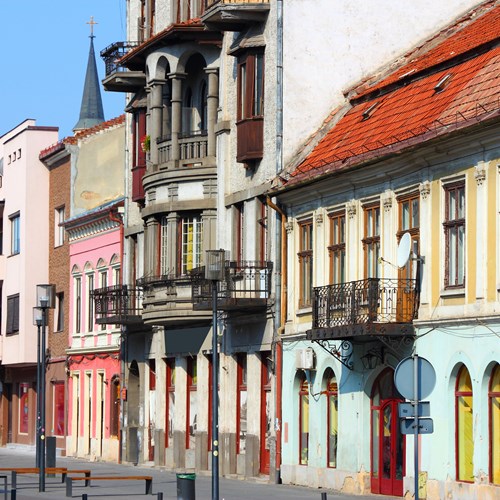
Cluj-Napoca, Romania
The unofficial capital of Transylvania, Cluj-Napoca is a place significantly less grim than its ominous administrative status may imply. Named European Youth Capital in 2015, the city is home to an estimated 100,000 students (who make up about a fifth of the population) – a statistic that partly explains Cluj's current cultural Renaissance and well-deserved reputation of a party town.
Population:
316,748
Currency:
Romanian leu
Emergency Numbers:
Emergency/Police/Fire Department: 112
Opening Hours:
Opening hours vary by business; most are closed on Sundays and work short day Saturdays. Shops and entertainment venues operate from around 8am to 6-9pm, often later. Nightclubs and some bars often remain open till the early morning hours.
Newspapers:
Actualitatea (In Romanian & English)
Nine O'Clock (English)
Clujeanul
The City

Transylvania's former capital effortlessly brings together medieval and Baroque architecture, and is home to Romania's second largest Gothic church – St. Michael's. Downtown Cluj-Napoca is somewhat of an open-air museum, one that breathes a nostalgic air of epochs forgone and contains no shortage of actual museums and attractions. Transylvania's notorious historic ruler – Vlad III, also known as Vlad the Impaler or Vlad Dracula – served as inspiration to the figure of Dracula in, first, Bram Stocker's sensational novel, and later the public imaginary and pop culture.
Little reminds visitors to today's Cluj (Transylvania's former capital) of the region's sinister past – European Youth Capital of 2015 buzzes with life, much due to its ever-increasing student population, which favours Cluj-Napoca's bohemian cafes, hip bars and – most notably – vibrant nightlife establishments. Due to its relative obscurity, Cluj remains an off-the-beaten path destination with prices that seem too low to be true – food and drink tend to be laughably cheap, and so are accommodation and transportation – at least for the time being. Cluj also plays host to quite a few cultural festivals throughout the year, so timing your trip to coincide with one of those is surely something to consider.
Do & See

Cluj-Napoca's charming historic town center is a pleasure to stroll through, with most attractions easily reachable by walking. Some of the city's highlights include the Ethnographic Museum (the open-air Ethnographic Park will require using public transport to get to), the curious Pharmacy History Collection, and the Gothic St Michael’s Church – the showpiece of Cluj's central square (Piata Unirii). Bohemian cafes and cool bars dot the city, making for interesting break spots.
Dining

Cluj-Napoca's dining scene is as varied and diverse as the city's cultural heritage - it features eateries specializing in Transylvanian, greater Romanian, Hungarian, and other world cuisines, down to relatively recent imports such as steakhouses and sushi bars. Some local specialties include different varieties of "ciorba" (soups), meats (sausages especially), and "mamaliga" (known as "polenta" elsewhere in the world) that often comes as a side.
Cafes

Keeping pace with emerging European destinations, Cluj boasts a vibrant cafe scene. There is often a rather fine line between what constitutes a cafe versus a bar, and the former often double as latter after sundown. One dessert to simply not be missed is the quintessential Romanian "papanasi" - a deep-fried pastry stuffed with a cheese or jam, topped with a sweet cream more often than not. Cheap eats on the go include pretzel-like "covrigi" and sugar-dusted doughnuts called "gogosi" .

